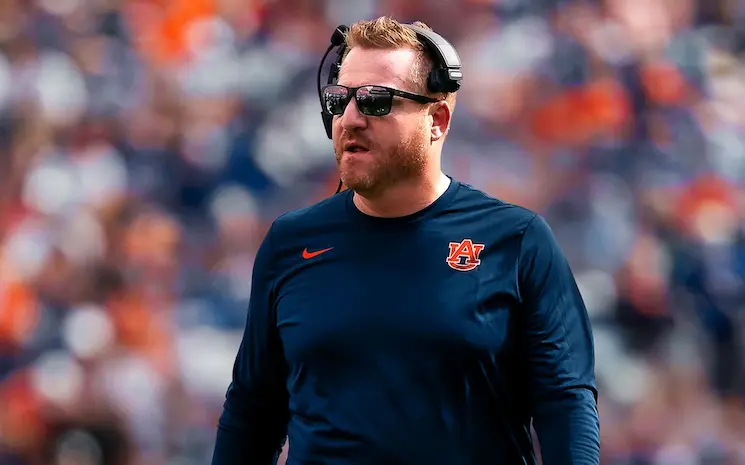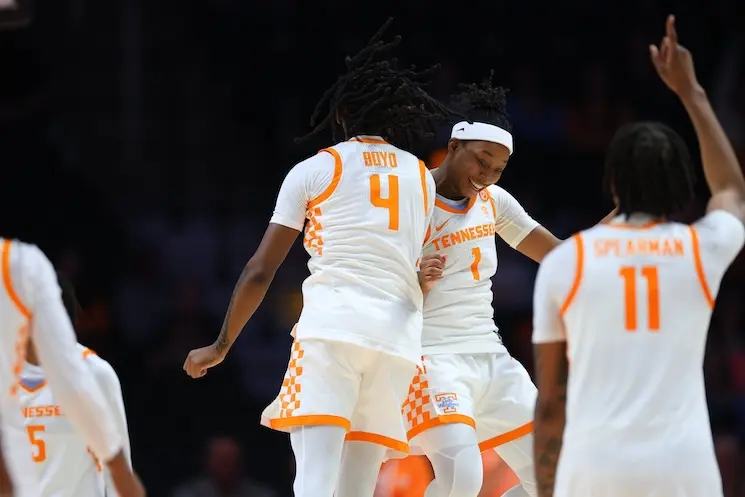CBB Recap: Ron Harper Jr. Hits Half Court Buzzer Beater To Upset #1 Purdue 70-68
For the second time this season, Tennessee’s offense faltered badly in Tuesday night’s overtime loss against Texas Tech.
The Vols shot just six-of-39 from three-point range and the Red Raiders’ unique personnel — all five starters are between 6-foot-6 and 6-foot-8 — allowed them to switch every screen and effectively take Kennedy Chandler’s scoring at the basket away.
That exposed one of Tennessee’s weaknesses, its lack of frontcourt scoring.
Through seven games, John Fulkerson is playing much better than he did last season while dealing with a myriad of minor injuries and “COVID fatigue.” The super senior is averaging 8.7 points, 6.6 rebounds and 2.7 assists per game.
However, Fulkerson isn’t playing like he did to close the 2020 season and isn’t making defenses respect him enough to double him in the post.
Fulkerson’s play hasn’t been Tennessee’s problem in the front court. He isn’t an elite scorer but he’s been reliable, a strong passer and a good defender.
It’s the play of Olivier Nkamhoua, Brandon Huntley-Hatfield and Uros Plavsic that’s leaving room for Tennessee’s frontcourt to improve.
Rick Barnes and Tennessee’s coaches bet on Nkamhoua this preseason, bringing in no transfer big men despite the Finland native playing just 7.2 minutes per game as a sophomore last season.
The inconsistencies that didn’t allow Nkamhoua to earn consistent playing time a year ago are showing up again this season. The power forward has had a handful of strong performances, but has just 12 points in Tennessee’s four games against power five opponents.
The last two games, Nkamhoua combined for five points and played a season low 13 minutes in each game.
“I think that where Olivier’s got to continue to improve is where he missed an easy shot,” Barnes said. “He came right down the floor and then took a shot that could he make? Probably, but being off balance like that it’s not a high percentage shot. So, it’s almost like in his mindset, I think he felt like when he missed that little bunny around the rim that, ‘I’ve got to get it back.’ He doesn’t have to get it back. He’s too good of a player and we’ve got great confidence and trust in him. That’s where he’s got to continue to grow. It’s tough when you miss those right around the rim when nobody’s guarding you, it really is.”
Nkamhoua played just two minutes in the second half of the loss to Texas Tech. Barnes credited that to being able to read the body language of his players.
Entering this season, Nkamhoua talked about how moving on from play-to-play was where he was improving the most. The junior has improved there but there’s clearly more room to grow.
“That’s been my focus and that’s where I’ve wanted to grow the most,” Nkamhoua said of his maturity and mentality. “I think I’ve done a good job of growing in that sense. I think I’m moving on play-to-play better. I think I’m understanding my role a lot better and I think I’m meshing with my team the best I ever have. I think I’m learning to play with all the teammates I have and am learning to play to their strengths and they’ve learned to play to mine.”
Freshman Brandon-Huntely Hatfield is fighting to earn more consistent playing time just like Nkamhoua, but for much different reasons.
Huntley-Hatfield played 12 or more minutes in each of Tennessee’s first six games, but the power forward combined for just 12 minutes against Colorado and Texas Tech. The Clarkesville native has high level talent and scoring that Fulkerson and Nkamhoua don’t possess.
The 6-foot-10, 246 pound forward is one of the most physically gifted players every time he steps on the court and has shown good touch and post skills.
“Physicality. We think Brandon is one of the strongest players we’ve ever coached,” Barnes said. “He’s learning how to practice better, that’s where it’s going to start. You saw the other night as soon as he came into the game there was no question that Texas Tech came right at him. They didn’t even hesitate one minute. It’s him understanding, and he is. Brandon is working at it and he’s come so far from when he first got here in the spring in terms of his mindset. Brandon is smart, he’s talented, but it’s a mindset to understand that’s a big jump from where he was last year to where he is today.
“Our schedule probably hasn’t helped him but it will in the long run. The big games that we’re in it’s going to help him. Do I think he can go out in some games and do better if we had a different schedule than we had, yeah probably. The fact is what we’re getting ready to get into come into December, every night is going to be a highly physical, contested game. We’ve got a couple more weeks to try and get him there. He had a great practice yesterday. We wanted him to be more physical in practice yesterday and he did a nice job doing it.”
Not having a complete grasp on Tennessee’s defense and the importance of every possession explains why Huntley-Hatfield isn’t playing 20-plus minutes a game. It doesn’t explain his 12 minutes in the last two games.
All that’s left to do is speculate on why his minutes have decreased. However, Barnes has always made it clear that if you don’t practice the way he wants, you won’t play. That could be the situation with Huntley-Hatfield as the young player is adjusting to the college game and not being able to dominate with his size and skill every time he touches the court.
Currently, Tennessee’s front court has accounted for just 31% of its points. If it’s going to make a big jump, Huntley-Hatfield is probably the reason why. He’s averaging just 4.6 points per game and has one of the highest ceilings of any UT player.
Uros Plavsic is the final guy to touch on here. The junior is playing 9.6 minutes per game but is playing as well as could be expected on the offensive end. Plavsic’s defense and rebounding is where he can improve and earn a bigger role.
Tennessee’s offense has sputtered when it hasn’t shot well this season. The bottom fell out from under the Vols in two of those games when Chandler struggled. The Vols need more consistency from its frontcourt in all areas, but if they can’t get more offensively they’re likely to be inconsistent on that end of the court.



